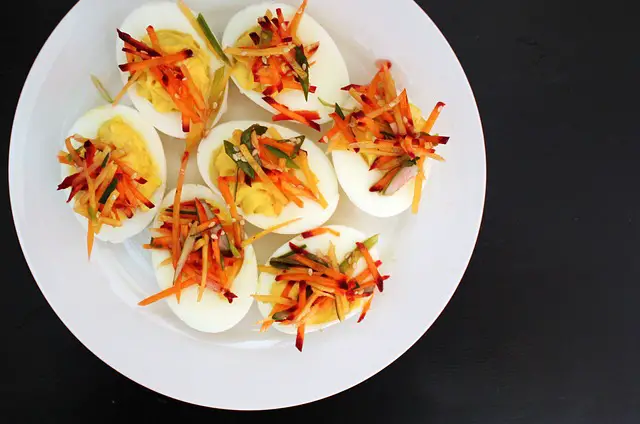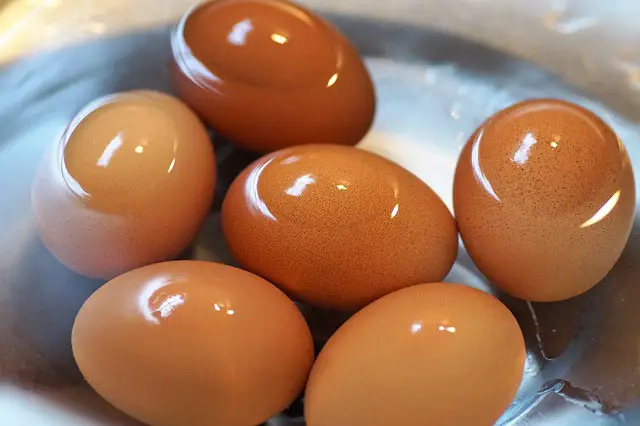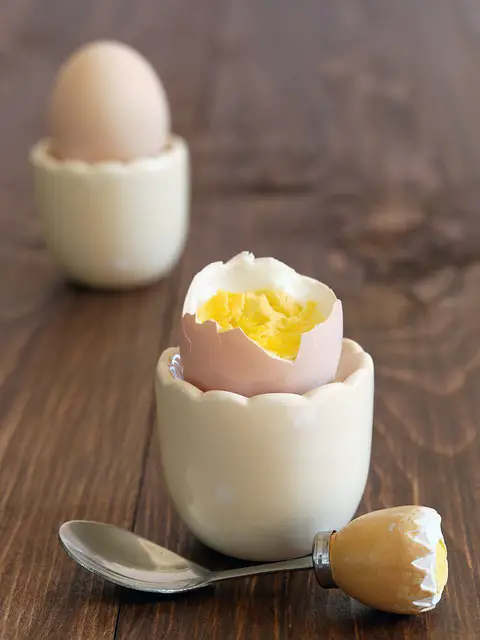
Before we dig into how long you can keep hard-boiled eggs in a refrigerator, let’s talk about how useful this protein source is.
Hard-boiled eggs make for a versatile, highly nutritious, and filling protein source. They can be eaten alone as a snack in between meals, as a protein source with other foods on your plate, or prepared for further use in a recipe.
However, with all the goodness that they offer, hard-boiled eggs have a short life span, even shorter than fresh eggs. This is because the washing and boiling process damages the protective cuticle on the outer shell and make it easy for microbes to get to the egg through the pores.
It is therefore important to store them properly through refrigeration to slow down the growth and penetration of bacteria.
Haven established the need for refrigeration, it is equally important to know how long one can keep hard-boiled eggs in the refrigerator.
Hard-boiled eggs can be kept for as long as 5 to 7 days in the refrigerator after which they must be consumed or trashed. This is because, after one week, the eggs dry up, lose quality and/or spoil.
Mind you, they must be stored with the shells still intact to remain fresh and moist. If the hard-boiled egg’s shell is broken or peeled off already, it is recommended that you eat it soon to enjoy the quality.
Of course, there are times when you have a lot of eggs on your hand with no one to share them with and you can’t possibly eat them all. If that’s the case, we have a simple hack for storing which we will share later in this post. So, no worries!
Table of Contents
How Long Can You Keep Hard-Boiled Eggs in the Refrigerator? – Things to Note
Hard-boiled eggs must be handled carefully and stored in the right conditions to preserve the quality.
They should be stored or consumed within 2 hours of preparation because leaving them out for too long gives enough time for bacterial growth (not today, Salmonella!).
Also, as with most foods, proper refrigeration should be at a temperature of 40 degrees Fahrenheit or lower to prevent the growth of microbes.

You may be wondering, ‘what if it is included in my lunch pack for work or for a picnic or on a buffet and it’s going to take a while before I can eat them?’ Well, we recommend that you store foods with hard-boiled eggs in a cooler to buy extra time on them.
Note that storing the eggs in the refrigerator door is a big no-no, as the temperature there is not as stable as the rest of the refrigerator.
More so, frequent opening and closing to pick or drop one item or the other in the fridge further increases the fluctuations in temperature in that part, which can cause the eggs to spoil.
So, ignore the egg compartment in your refrigerator door and place your hard-boiled eggs on the main shelves, preferably the middle ones, and towards the back of the fridge, as the temperature in this section is usually more stable.
How to Store Hard-Boiled Eggs in the Refrigerator
You can arrange them in the egg carton they came in to prevent them from absorbing smells from other foods stored along with it. The carton also helps retain the moisture.
If it is no longer available, or you don’t wish to, then store in an airtight storage container.
By the way, it is advisable to store hard-boiled eggs is with the shells intact. This eliminates the chances of contamination and moisture loss. So, you will need to take extra steps to prevent moisture loss if the eggs have been peeled.
A simple hack to storing hard-boiled eggs in a refrigerator properly is to line the storage container with a damp paper towel before placing the peeled eggs in it. Then you can place a damp paper towel on top of the eggs before covering the container and placing it in the refrigerator.
Another way is to cover the peeled eggs with cold water. Apart from maintaining the moisture, this method also helps to maintain a constant temperature. However, you must remember to change the water every day.
Having said that, make sure to label the carton or storage container with the date of boiling to keep track and ensure timely consumption (or disposal if it exceeds the storage limit).
[amalinkspro type=”showcase” asin=”B000QRFOLC” apilink=”https://www.amazon.com/dp/B000QRFOLC?tag=refrigeratorsreviewed-20&linkCode=osi&th=1&psc=1″ new-window=”true” addtocart=”true” nofollow=”true” sc-id=”4″ imgs=”3″ link-imgs=”false” specs=”Keeps up to 20 of your farm-fresh, boiled, or devilled eggs fresh while preventing them from getting smashed or crushed.~~~Outer lid makes a tight seal with the platter for secure transportation.~~~Made from thick and durable plastic – BPA-free, dishwasher and microwave-friendly, and freezer-safe.~~~~~~~~~” btn-color=”#ff9900″ btn-text=”View on Amazon” alignment=”aligncenter” hide-prime=”0″ hide-image=”0″ hide-reviews=”0″ hide-price=”0″ hide-button=”0″ width=”1000″]Rubbermaid Specialty Egg Keeper Food Storage Container[/amalinkspro]
How Do I Know When Hard-Boiled Eggs Have Gone Bad?
Hard-boiled eggs, as with other forms of eggs, need careful handling as they can still go bad. This warrants adequate attention to detect spoilage, and immediate disposal to prevent food poisoning.
So, it is better to be safe than sorry by discarding the hard-boiled eggs if they:
- have been sitting out for too long
- were kept in the refrigerator for over a week, and/or
- are showing signs of spoilage.
Here are signs that show that hard-boiled eggs have gone bad:
1. Rotten smell
When eggs go bad, they give off a very bad, pungent, and yucky sulfur smell. If you notice this coming from your eggs, then chances are that the eggs have been contaminated and have gone bad.
If it’s a faint smell and you’re unsure, or you can’t perceive it at all, crack the egg open and sniff to decide whether it is good or if it should be tossed in a trash can.
2. Sliminess
Sliminess is a sure sign of spoilage, whether it is just on the eggshells alone or also on the egg whites and yolks. Of course, you know what to do, throw it away!
3. Chalky or Powdery Shells
When the eggshells turn powdery or chalky in appearance, it shows that they have been compromised and the egg parts inside have most likely been contaminated.
It’s best to throw the eggs like this away.
4. Discoloration
An abnormal color points to spoilage too.
However, this discoloration is different from the green or gray yolk color that comes from overcooking the eggs.

Check out these other in-depth articles/reviews…
- Frigidaire 8-Bottle Wine Cooler — Detailed Review
- Costway 6-Bottle Wine Cooler Review — In-depth Review
- Garage Refrigerators: How to Buy the Best
- Igloo 12-Bottle Wine Cooler — Detailed Review
- NewAir 12-Bottle Wine Cooler — Extensive Review
- Westinghouse 6-Bottle Wine Cellar — Detailed Review
Quick Recap on How Long You Can Keep Hard-Boiled Eggs in the Refrigerator
Hard-boiled eggs make easy breakfast favorites because they are nutrient-packed, belly-filling and quite easy to make.
It is important to consume hard-boiled eggs within 2 hours of preparation to preserve quality.
If you need to keep them for another time, then refrigeration is necessary to prevent contamination and spoilage.
Hard-boiled eggs can keep in the refrigerator for up to a week. But, they must be packaged properly to prevent moisture loss and contamination. They should also be stored on the main refrigerator shelves and not in the door compartments.
Ensure that you also check for signs of spoilage before eating a hard-boiled egg to avoid food poisoning.
The video below highlights how to tell if eggs have gone bad. Check it out to learn more!
Related FAQs — How Long Can You Keep Hard-Boiled Eggs in the Refrigerator?
How Do You Tell If Hard-Boiled Egg is Done?
You can tell that a hard-boiled egg is done by spinning it on a table or a counter. Touch a finger on the egg while it is spinning. If the egg spun rapidly and came to a quick stop when you placed your finger on it, then it is cooked and done.
Raw eggs, on the other hand, won’t spin as easily and when they get to spin, they won’t stop as quickly as a hard-boiled egg will.
Should You Peel Hard-Boiled Eggs Immediately?
You don’t need to peel hard-boiled eggs immediately especially if you are not ready to eat them or ready to put them in a recipe.
However, if you peel hard-boiled eggs then you either need to eat them within 2 hours or refrigerate them. Also, keep in mind that cooked eggs in your fridge need to be consumed within 1 week from the date they were cooked. So, don’t forget to label your eggs when you place them in the refrigerator.
How Long Should You Wait to Peel Hard-Boiled Eggs?
It is best to wait for about 10 minutes to peel hard-boiled eggs. By this time, the eggs would have cooled down to room temperature and will be easy to peel.
To peel your hard-boiled eggs easily, add half a teaspoon of baking soda to the boiling water when you boil the eggs. Once you’ve brought the eggs to a boil, place the hard-boiled eggs in cold water for about 10 minutes. This will stop the heat on the eggs from cooking the eggs any further so that they are not overcooked. Finally, take one egg at a time, crack it and peel it with ease.
Can You Get Sick From Eating Old Hard-Boiled Eggs?
You can get sick from eating old hard-boiled eggs if the eggs were not properly stored or properly cooked. There’s also a high risk of Salmonella infection, also known as food poisoning if you eat hard-boiled eggs that either stayed too long in storage or were left for too long under room temperature conditions.
You can reduce the risk of getting sick from eating hard-boiled eggs by cooking the eggs properly and thoroughly, throwing cracked uncooked eggs away, and keeping cooked and uncooked eggs refrigerated.
Can I Freeze Hard-Boiled Eggs?
Yes, you can freeze hard-boiled eggs; particularly the egg yolk.
On the other hand, it is best not to freeze egg whites from hard-boiled eggs, because the texture of egg whites becomes rubbery after freezing them.
To freeze the yolk from hard-boiled eggs:
- Put the egg yolks in a frying pan without stacking them.
- Add some water up to 1 inch above the egg yolks.
- Cover the saucepan and leave the egg yolks to boil.
- Take the pan off the stove and leave the yolks to stand for about 10 minutes.
- Remove the yolks from the water, drain them, and pack them in freezer-safe bags.
- Finally, place the bags of egg yolks in your freezer.
Get Instant Help — Ask An Experienced Verified Appliance Technician
Need expert help? Click here to use the chat box on this page to speak with a verified appliance technician right away. No need for expensive in-home service calls. No appointments. No waiting.